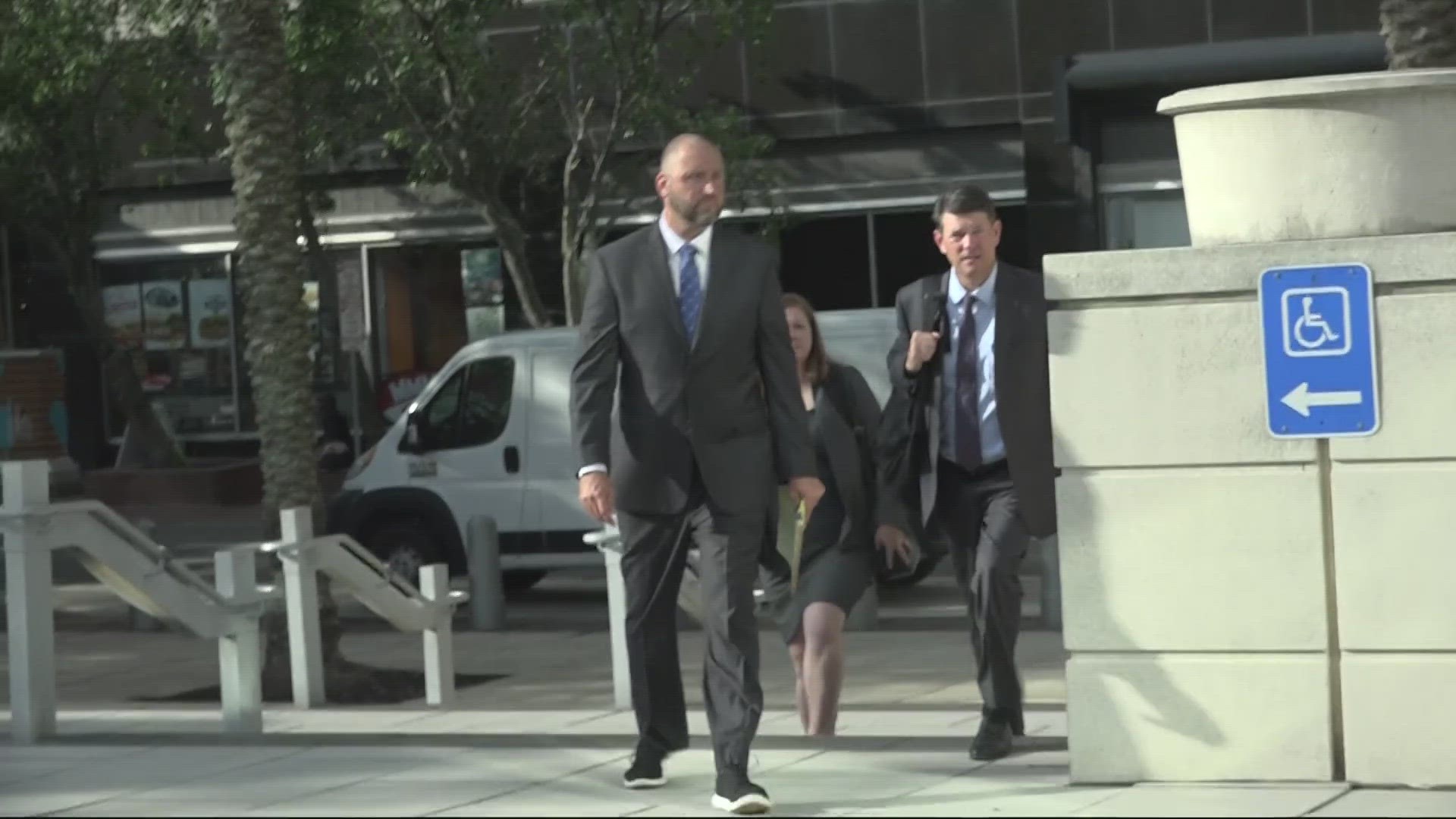JACKSONVILLE, Fla. — An effort by federal prosecutors to demonstrate “what we knew and when we knew it” is lifting the veil on the criminal investigation into top JEA executives.
Day two of the pretrial hearing was devoted entirely to the testimony of the lead FBI investigator in the corruption case against two former JEA executives.
Ousted CEO Aaron Zahn and former Chief Financial Officer Ryan Wannemacher are charged with conspiracy and wire fraud for their role in crafting what prosecutors claim was a fraudulent attempt to enrich themselves at the expense of JEA ratepayers.
Both have pleaded not guilty. Their attorneys demanded the so-called Kastigar hearing, which began Monday. They contend the prosecution team was tainted by, and its investigation -- at least in part -- guided by the constitutionally-protected statements Zahn and Wannemacher gave city officials investigating JEA.
Government lawyers must prove they did not rely on the defendant's compelled statements in building their case. To that end, U.S. Attorney Tysen Duva is detailing the government’s investigative process, including emails, memos and financial documents obtained by investigators, along with the steps they took after obtaining those documents, including issuing more than 40 subpoenas.
Zhan’s attorney Eduardo Suarez has raised frequent objections to the style and substance of the government’s presentation, but Duva has said the information -- including occasionally conclusory testimony from lead FBI agent Bobby Blythe-- is necessary.
"We have to establish what we knew and when," Duva said. “It’s relevant to educate the court about the facts and what we were thinking [in our investigation]."
He has called the Kastigar hearing “an odd construct,” one that the defendants themselves demanded. And Magistrate Judge Monte Richardson has agreed to give prosecutors “leeway” in presenting their case.
The Kastigar hearing has so far have stitched together the origins of a payout scheme that could have netted JEA’s senior leadership team millions in the event of a planned sale of JEA. As Blythe testified Monday, a key trigger was investigative reporting by the Florida Times-Union. The question of whether the plan was even legal was the focus of much of Tuesday’s hearing. Blythe testified about a March 2019 memo from the law firm of Nixon Peabody which gave JEA a flat "no."
That opinion didn’t make it to JEA’s Board of Directors or the public. Blythe testified the memo was found in the desk drawer of a former city attorney during the city’s investigation of the JEA debacle.
Prosecutors also presented what they said was evidence that various consultants hired by JEA were “siloed,” providing information about strategic plans or employee incentives programs without the knowledge that a sale of JEA was in the works. Blythe testified that “it wasn’t until much later that [a consultant] was informed of JEA’s intent to move in that direction."
While several consultants said they were unaware that a sale was in the offing, prosecutors also showed document metadata indicating Wannemacher was making calculations about the Performance Unit Plan payouts contingent on the sale of JEA. One of those calculations showed the “book” value of JEA jumping from $1 billion to $4 billion in a one-year period – a value surge that could only come from privatization.
Prosecutors also showed hours of JEA board meeting footage, showing how the “doom and gloom” predictions of the utility’s future – which executives said would necessitate raising rates and laying off 574 employees – were tied to plans for the PUP.
“Employee incentives should drive value and teamwork,” Zahn told the JEA Board at a Jan 22, 2019 meeting. “You wouldn’t see direct changes in behavior [to improve JEA performance], because employees aren’t incentivized to do so”
Duva noted that the dour predictions came shortly after executives made far sunnier presentations on JEA’s financial state. “Two months later, 'If JEA doesn’t do something drastic it's going to fall off a cliff,'” he said. “JEA’s doing great -- but very, very soon it’s going to do very bad.”
The dire forecasts presented by JEA senior leadership team included cancelling the utility's new headquarters. Duva wryly noted it had been built, despite those predictions, directly across the street from the federal courthouse.
Blythe testified that former Chief Operating Officer Melissa Dykes did not want to present the so-called “doom and gloom” projections of the utility’s financial future to the board.
“She was ordered to. She didn’t want to,” Blythe testified. Asked who gave Dykes the order, he said, "Aaron Zahn.
Zahn could be seen occasionally shaking his head, as if in disagreement with Duva's assertions.
Dykes is not charged in the case and is expected to testify at the week-plus-long hearing.
Prosecutors have repeatedly noted how media coverage of the evolving JEA scandal informed their own investigation. It also had an impact on JEA consultants. In January 2020, after the Florida Times-Union reported on the potentially lavish PUP payouts, Willis Towers Watson, a consultant hired to help JEA create short- and long-term incentives compensation plans, wrote to Dykes, who was running JEA after Zahn was removed. According to Blythe, they were clear: “The PUP plan was not our plan.”
“Based on recent media articles ...we felt it’s imperative to clarify WTW’s role in JEA’s long term incentive plan,” the letter said. The final long term incentive plan proposed “is one WTW would never have designed or endorsed.” Noting that their name was affixed to some documents presented to the JEA board, the letter continued, “nor was permission given to make changes to our document. We do not support the final plan design as developed.”
The Kastigar hearing continues Wednesday with additional testimony from Blythe. Among those expected to testify later this week are former JEA CEO Paul McElroy and Kevin Blodgett, who helped lead the investigation into the JEA sale on behalf of the City Council.

